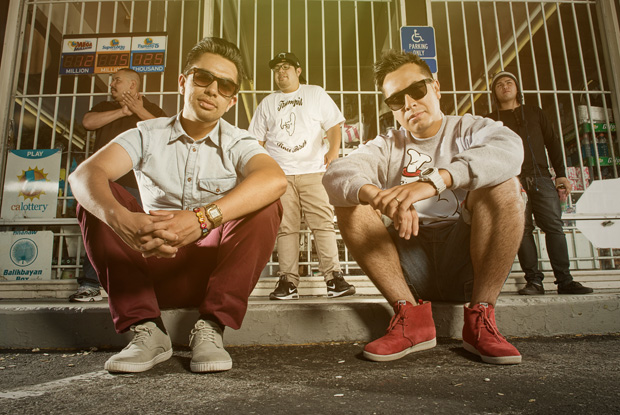Although they’re brothers, it wasn’t until 2010 that San Jose musicians Raul and Mexia Hernández made a serious attempt to collaborate. The resulting song, “Todos Somos Arizona (We Are All Arizona),” a protest against the anti-immigration law SB 1070 that had just passed in Arizona, quickly earned the duo more attention than anything either brother had ever released separately.
The song went viral after they uploaded a surprisingly simple, single-shot video to YouTube of them performing the song at their home. Raul played the keyboards and sang the chorus in Spanish (“I just want to succeed/and now they want to deport me”), while Mexia rapped in both Spanish and English, advocating for immigrant rights. They were joined by younger brother Giovanni who gave the song rhythm by beating on a trash can.
They were surprised by the immediate response. It wasn’t just other Americans frustrated by what many considered to be a racist law but the media, too. They got an email from a staff member at “Al Punto,” a popular Spanish-speaking news program hosted by Jorge Ramos, who invited them on the show.
“This was the first time we realized that what we were doing had an impact,” Mexia says.
What the producers hadn’t yet realized was that they weren’t just anybody; they were the sons of Hernán Hernández, bass player of Los Tigres del Norte, one of the most famous and politically outspoken Norteño bands in the past 40 years.
“Once they found out, that’s when it escalated a little bigger,” Mexia says. “They were like, ‘Here’s the sons of who we consider to be the voice of our generation.’”
The song’s response made it clear that they had a good thing going on together. They decided to shelve their respective solo careers and work on an album together under the moniker Raul y Mexia. The duo performs at Pagoda Lounge for a record release party on March 30.
Part of what gave “Todos Somos Arizona” a unique sound was how the brothers combined their different musical tastes. Raul has always loved hip-hop, while Raul has a penchant for writing tender, romantic ballads.
For Raul y Mexia, they wanted to continue this fusion of styles by allowing room for all the American music they grew up listening to, not just hip-hop but also electronic and rock music, while still paying tribute to the music of their cultural heritage, like banda, Tejano, cumbia and Norteño.
“We didn’t try to push too much for one thing, we just wanted it to be a fusion,” Mexia explains.
http://youtu.be/ydIVy7wqGZQ
After working with a couple different producers in Miami, they met Toy Selectah, from pioneering Español hip-hop group Control Machete, who invited them to come down to Monterrey in Mexico to work on some songs. The brothers really felt like he was the first person to understand their vision.
“Toy was the catalyst that’s been able to bridge the gaps between the United States and Mexico,” Raul says. “It was really important for us to express the music of our culture, and Toy would do that, and then add in synths and things like that.”
For the songs, they created a blueprint by first laying down tracks of traditional Norteño instruments: accordion, bajo sexto (a traditional 12-string guitar) and the double bass. From there, they would twist and pull the songs in modern ways by playing with electronic instruments and drum machines. They even sprinkled in instruments that were traditional to other Latin American countries.
“It’s a little bit of everything; it’s what America is today,” Mexia says. “You go eat Italian food, then go down the street and eat Chinese. It’s all in one spot. That’s what we want to do with our music.”
The duo also took a step back from political songwriting and focused instead on writing fun songs that tinkered with different genres. By the time they’d finished their debut album, Arriba y Lejos, they’d gotten some interest from major labels, but it never worked out.
Selectah sent a copy to Nacional Records, which is known for working with innovative and cutting-edge Latin artists. The label was very interested in the brothers, but it took a year of discussions before Raul y Mexia was signed.
“A lot of people expect because we were sons of somebody famous, that the process would be a lot easier, that the doors would just open,” Mexia says. “Yeah, we get people’s attention, but it took a lot of work.”
Part of what stood in Raul y Mexia’s way was the very fact that people knew who their dad was, and they expected them to make music exactly like Los Tigres del Norte. But being first-generation American, they’ve had an entirely different experience than their father, something they hope to explore more on their next album.
“When we got to Mexico, they can tell right away that we’re not from there,” Mexia says. “We come back home, and we face those same kind of issues. You get stereotyped, especially with this whole SB 1070 law.”
So far, their debut album, which was released in February, has already been a success, primarily with other young Latino Americans, who relate to the vast pool of musical influences with which Raul y Mexia grew up.
“Latino youth of today are pretty much open to everything,” Mexia says. “There’s really no barriers, no limits. They’re listening to Los Tigres del Norte then listening to Dr. Dre.”
Raul y Mexia
Saturday, March 30; 10pm; $10–$20
Pagoda Lounge, San Jose
.San Jose’s Raul y Mexia Cross Generations and Genres With New Album




